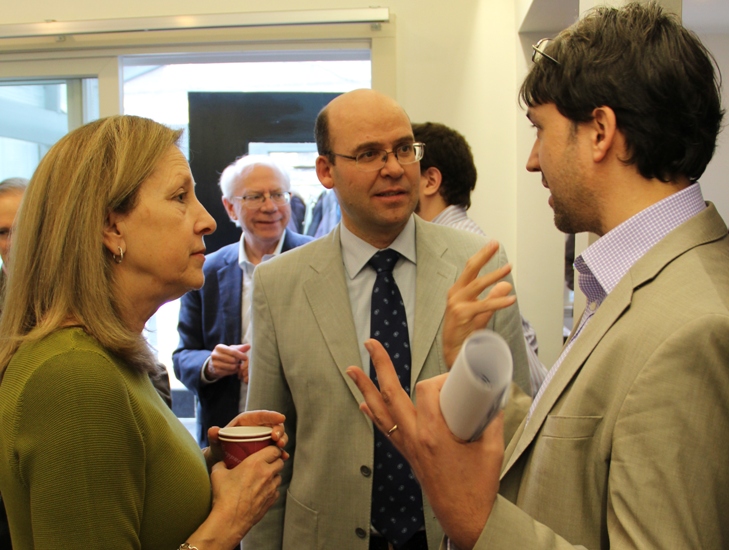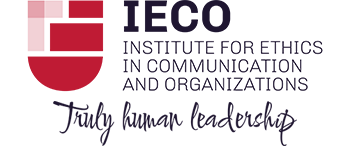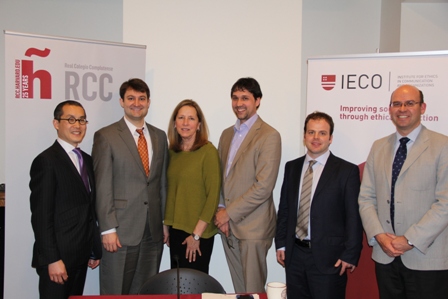For the third consecutive year, The Institute for Ethics in Communication and Organizations (IECO) and the Real Colegio Complutense (RCC) at Harvard University have organized the International Colloquiums IECO-RCC. Speakers reflected on institutional corruption and how to enhance, from a humanistic management approach, the ethical health of organizations.
The third IECO-RCC Colloquium took place during the morning of March 27 of 2015, in the head office of the Real Colegio Complutense (RCC) at Harvard University, with the attendance of almost thirty managers and scholars from the Boston Area.
The colloquium was moderated by William English, IECO fellow and Research Director of the Edmond J. Safra Center for Ethics at Harvard University. Among the speakers, there were Michael Pirson, founder of the Humanistic Management movement and professor of the University of Fordham Business School in New York; Donna Hicks, professor at the Weatherhead Center for International Affairs at Harvard University; Michael O’Mara Shimek, professor and researcher of the IECO in Valencia; and professor Nien-he Hsieh, from the Harvard University Business School.
In his introduction to the colloquium, professor William English underlined the need to fight against institutional corruption, the area in which he and his team have focused their research for the last five years. For him, the colloquium offers a unique opportunity to strengthen the fight against institutional corruption, from a positive approach: humanistic management that allows us to construct ethically healthy organizations, thus allowing for organizations which build trust between their members and also in their relations with society.
For his part, professor O’Mara Shimek defined ethically healthy organizations as those that promote the integral human development of their members. From this point of view, the firms which pretend to be socially responsible but do not ground their whole activities on moral criteria, are not healthy and definitely do not contribute towards building a healthier society. This contribution can only be made by putting ethics at the core of management, which is precisely what a humanistic management approach aims to attain when it is applied to all the organization activities, but especially to those related to ethically qualified CSR policies.

In the same way, professor Michal Pirson explained in simple terms which are the main aspects of the humanistic management approach. This global movement was catalogued as one that defends dignity and common good as the core of ethically healthy organizations.
Finally, professor Donna Hicks considered that when managers promote human dignity, they do so by focusing individually on every human being’s inherent value and, consequently, increase the level of trust within organizations.
 [vc_row][vc_column][vc_column_text]Enlaces relacionados:[/vc_column_text][vc_btn title=”Canal YouTube de Harvard: Tercer Coloquio Internacional IECO-RCC 2015″ link=”url:https%3A%2F%2Fwww.youtube.com%2Fplaylist%3Flist%3DPL2SOU6wwxB0sjGNkZ0IIssCZD5SXCF2en||target:%20_blank|”][vc_btn title=”Universitat de València: La Universitat de València y Harvard debaten sobre la ética y la corrupción en las organizaciones” link=”url:http%3A%2F%2Fwww.uv.es%2Fuvweb%2Funiversidad%2Fes%2Flistado-noticias%2Funiversitat-valencia-harvard-debaten-etica-corrupcion-organizaciones-1285846070123%2FNoticia.html%3Fid%3D1285940890242||target:%20_blank|”][/vc_column][/vc_row]
[vc_row][vc_column][vc_column_text]Enlaces relacionados:[/vc_column_text][vc_btn title=”Canal YouTube de Harvard: Tercer Coloquio Internacional IECO-RCC 2015″ link=”url:https%3A%2F%2Fwww.youtube.com%2Fplaylist%3Flist%3DPL2SOU6wwxB0sjGNkZ0IIssCZD5SXCF2en||target:%20_blank|”][vc_btn title=”Universitat de València: La Universitat de València y Harvard debaten sobre la ética y la corrupción en las organizaciones” link=”url:http%3A%2F%2Fwww.uv.es%2Fuvweb%2Funiversidad%2Fes%2Flistado-noticias%2Funiversitat-valencia-harvard-debaten-etica-corrupcion-organizaciones-1285846070123%2FNoticia.html%3Fid%3D1285940890242||target:%20_blank|”][/vc_column][/vc_row]

